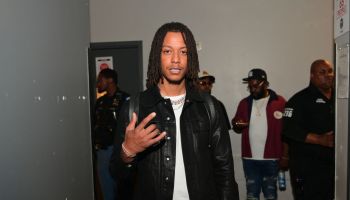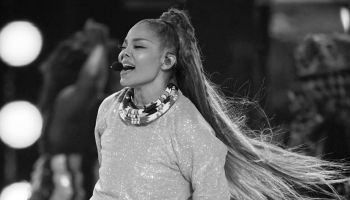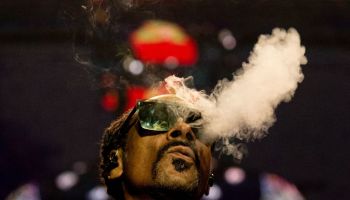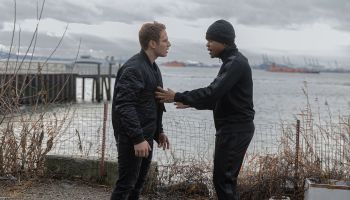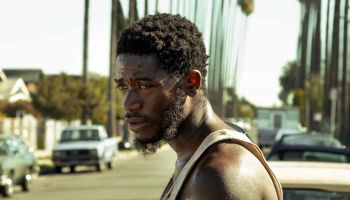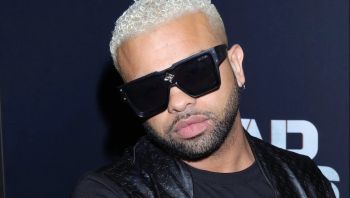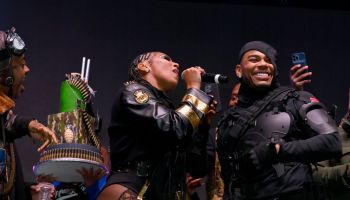Several weeks ago GlobalGrind spoke to “RuPaul Drag Race” Season Three Winner Sutan Amrull, aka Raja, a make up artist with a client roster which includes Dita Von Teese and Adam Lambert.
Amrull has also appeared on several seasons of model turned producer Tyra Bank’s “America’s Next Top Model,” appearing over nine seasons, sometimes impersonating the former Sports Illustrated model.
Since the first episode of Season Three of “RuPaul’s Drag Race,” pundits correctly called it that Amrull/Raja would win the competition outright. His creativity, presentation and overall charm was engaging, adding a serious layer to the discussion about gender and identity in gay and American culture at large. In short, Raja was not an ordinary drag queen born in Baldwin, California.
Amrull, who is Indonesian and American and in his 30s, learned how to apply make-up when he was a teenager, learning the art from a friend named Eva who was under house arrest for breaking into a restaurant on the Santa Monica Pier. He is a seasoned drag performer with an encyclopedic knowledge of fashion. On the show, Amrull as Raja was flawless.
We spoke to Amrull/Raja via telephone while he was in Orlando, Florida for a gig. Here’s some of what was said.
GlobalGrind: Can you start by telling us how the idea of Raja came about?
Raja: Um, well let’s see. I’ve been doing it for a long time. I started when I was 16, just experimenting with drag. My first few years I was just kind of like, you know, playing with it. I was doing really club cute looks and kind of putting together outfits out of trash. Things like saran wrap and nonsense. We were just making costumes out of it. And then eventually, as I started to play with it a little more, people were like, ‘Gosh, you’re really kind of pretty. Like, why are you wearing all these weird costumes? You know, you should really try to be a little more fishy.’ So at around age 18 or 19, I really started to dabble within that sort of look and that’s how Raja really developed. That’s about the same time that the name came. It really was just trial and error and just me fucking around with things. Playing around and really just developing. I knew that there was something within me that was, for lack of better words, you know, fierce. You just kind of know it. You’re born knowing it, but it’s just a matter of making it come to fruition. You know, making that sort of butterfly come out of a cocoon.
[pagebreak]
The character is someone that’s very different from what we’re used to seeing in drag. It almost seems like it’s performance art because of the detail and the history and the references that the character pulls.
Right, it’s hard to really call Raja a character, because Raja is me. It’s the way I am. You know, there’s very little separation between my drag personality and my actual person, myself as a man. As I’m getting older, I’m starting to see that merge even more. Now it’s just becoming one person, you know? But that’s how I am. I really enjoy historical reference and I love fashion. One of my favorite things to do is go to the Museum of National History, art museums and learn. I love reading fashion magazines. I love reading. I have a lot of interests. And Raja is a way for me to really make that come out.
One of the things we noticed, and we’re sure millions of other people noticed as well, is that you have this vast pool of reference that some of the other contestants in the show didn’t have. It seemed to have caused rifts, in terms of the cliques that were formed, the Heather vs. the Boogers and so on. We find it really fascinating that as an entertainer, as a drag performer, that type of reference is necessary. Because you’re not only entertaining, but you’re also educating at the same time.
Absolutely. I was always that kid. As soon as I started doing drag, I wanted to know everything about it. And when I say everything, I wanted to know everything. I’ve just always been that kind of a person who loves to learn and I’m still learning. I’m not that type of person who thinks, ‘Oh yeah, I’m at the top of my game and that’s all I need to do.’ You have to constantly learn and absorb more information. That’s just kind of the way I’ve always been. I think kids who are starting out need to know that. You can’t just be, you know, spouting’ off all your “gayisms” like, ‘Work it bitch!’ and all that stuff. Those words came from somewhere. Someone a lot older than you and a lot older than your parents, perhaps, spouted those words out before you did, way the fuck before you did. And you need to know who that person is. Find out where it comes from and then you do your shit; know your shit.
[pagebreak]
What was also interesting about the show, this season, more than ever, there’s just been talk about gender differences and the gender roles men who dress in drag play. Also the education aspect of explaining to people what “gender fuck” is. We’ve never actually seen this discussed on TV; it was actually on the show. We thought that that was amazing. How incredible it is that we’re able to watch a TV show about gay people, whereas 20-30 years ago this could only have been possible on access TV!
Absolutely, absolutely. And you know what, I was saying to … I don’t remember, it was perhaps another interview. I was saying that I love that now, in this day and age, in 2011, that we have a drag standard. That we know what is not good drag and we know what is bad drag because we’ve developed a standard. We have the freedom now, or we’re coming to the point where we have the freedom, to have a standard. Where as, when I was growing up, when I was first coming out, sure there was a standard but it was within a subculture. Now it’s out in the open. It’s up to us gay people, constantly, this has always been our job in history, to teach people, to teach new ideas, to make things that are not so beautiful, make that beautiful … Gay people will go into some dumb part of town and make it totally gorgeous. That’s our job. That’s what we do. That’s our job as the “gay creature,” that we are, to make things beautiful.
Growing up as a gay kid, was it difficult for you? Was it hard for your parents and your friends to accept who you are? Was it obvious to them that you were gay, or did you have to come out to them?
I think it was pretty obvious that I was gay. I joke with people and say my mom is still wiping the glitter off her thighs from when I came out. Because glitter gets everywhere and it’s hard to get rid of. I think I’ve always known I was gay. But it was a problem, I grew up in the hood basically. I grew up in La Puente, California, which is predominantly Mexican and there was a lot of gangs and we had drive-bys on our school bus. It was pretty rough at the time. My father is a minister. I grew up in the church, and I was really involved in church. I loved church because church was like theater to me. There was a stage and you could sing on the stage and there were plays at a certain time of the year, at Christmas. Church was like a stage for me and that was where I first got my start. But it was very difficult because, even as a kid, you just feel this desire to be something else, to be more fabulous than what’s around you. And I just made it fabulous for myself. I wore really crazy outfits walking down the street as the low riders were like honking, throwing shit at me. I didn’t care. I was like, I was fierce. I had a caesar haircut, bellbottoms and platforms; and I was just doing it, you know?
[pagebreak]
You embraced your difference, or your otherness, at an early age. Did you ever feel like there was something wrong with you, or got the impression and the pressure from others that there was something wrong with you and that you had to change?
Absolutely. I grew up in the church basically and homosexuality is a sin. And being over the top, maybe, is a sin. But I think as soon as I reached my teens, I sort of made a conscious decision on my own just to kind of go against the grain. I mean, my parents even sent me to counseling when I was about 17. They sent me to Christian counseling. Really not to change me, but to really help me with whatever was going through my head at the time. The Christian counselor, after a few visits was like, ‘Dude, you gotta go, ’cause you gotta go live your life. There’s something inside of you that needs to happen. And there’s nothing that I can say, that your parents can say, because it’s clear that there’s something within you that you just need to express.’ He told me, ‘I can’t tell you exactly what it is because it’s something that you have to do.’ And he basically just told me to go. This was a Christian counselor. This was the best advice I ever heard from anyone, just ‘do your thing.’ Do what you need to do that’ll make you fulfilled and happy.
[pagebreak]
When did you arrive at fashion? When did you know that you wanted to work in fashion and be a makeup artist?
Probably in my teens. I bought my first Vogue magazine when I was about 16 and that was you know, in the ’90s. That was about the prime of supermodels and I was obsessed. That was when there were never celebrities at that time, we didn’t have actresses on the covers of magazines. It was always a beautiful Amazon woman. The cool thing is now, I’ve gotten to meet some of them and a few of them are my friends. But I just knew I loved it, I knew that fashion was synonymous to art. I spent most of my life, most of my adult life … as a young boy I didn’t realize that you could wear art. That’s where I came into my full love of fashion, because I knew that I could wear beautiful things.
You’ve worked with some of the biggest names, you’ve worked with Tyra Banks and now you’re working with Adam Lambert. How is it working with Adam Lambert?
Adam is cool. Adam is very cool. He’s a very good friend of mine. He’s an awesome guy. We come from the same sort of tribe of people in L.A. We’re just the creative types who gravitate towards each other. We have a lot of parallels in our lives, especially now. He’s been able to teach me a lot about newfound fame and how to deal with it. He’s a really great guy. It’s good to have someone around that inspires you.
We know things are edited on “RuPaul’s Drag Race.” What is it that we didn’t see that you would like to share?
I think people missed out on the warmth that happens. The show really focuses a lot on drama, which I understand. Who wants to watch a show where everyone’s just huggin’ and loving’, you know? But I think there were a lot of great moments, even between Shangela and me where we just had some great cackles, laughing, you know. At the end of the day, we all went to the same hotel and shared a meal together and actually got to know each other more than what is shown on the show. I really wish people could see that and see that in real life we are really not enemies of each other. We’re all pretty cool and we support what we do.
[pagebreak]
One of the things that was really enjoyable was the chemistry between you and the other Heathers, Especially Carmen. Were you friends beforehand? You were friends with Delta prior to the show, but for the rest of the Heathers, were you guys friends before the show as well, or is that something that developed while on the show?
No, we weren’t friends at all. In fact, when I first saw Carmen and Manilla on the first day I was like, ‘Ill, not into these people.’ Like, ‘Why is that Chinese one so loud and who the hell does that Mexican think she is?’ You know, I didn’t even get it. Then as time passed I was like, ‘Oh wait a minute, these two right here, we have the same sense of humor.’ Delta and I do and we’re pretty sick. We’re crazy. We say the worst things and we planned it; so we think that’s the funniest thing to ever say. In other words, we just have the same sense of humor and we laugh at the same things. We just kind of totally had a magnetic chemistry. I still talk to them every day and I love them.
The chemistry between you and Carmen, especially when you were in the bottom two lip syncing for your lives, it was really palpable. It was like one of the most incredible things we saw on TV. Was it edited that way, or was it real? Was it something that we imagined?
Well, another thing that people don’t see is that Manilla and Delta and myself, we definitely have the sense of humor thing that brings us together. But Carmen and I … I feel we have a chemical reaction to each other. Carmen is a cat basically. She loves to be pet. Her favorite thing to do was to just snuggle up on me. And she would smell on my shoulders and my neck and she’d be like, ‘Mmmm I love the way you smell.’ In fact, sometimes she text messages me. She’s like, ‘I miss the way you smell.’ You know? We have a chemical reaction to each other. So, when it came for us to lip sync, it was just natural. We’re like, ‘No let’s get on, let’s get it, let’s just do it, let’s get close.’ And so it was just kind of a natural thing for us to do.
Now, you travel a lot, have you taken Raja internationally?
Not a whole lot. A few years ago I was hanging out in Spain and they were like, ‘Oh, you know, why don’t you get in drag and we can put you in a show.’ They just threw me in there and I made like 75 Euro for the night, which is basically four cocktails. We just kind of laughed. I kept the drag on and ran to some other clubs and ran around Barcelona and got some Ecstasy in drag. It was great! But not really, not a lot of international appearances yet.
[pagebreak]
Do you think that people respond to you differently as a person of color doing drag than say, a regular gay guy? Is there a difference in how they treat you, in terms of attitude?
As far as ethnicity, or just me all together?
Both.
Over time I’ve kind of discovered that, especially in drag, people can’t really figure out what I am. They don’t realize that I’m Asian and I’m very Asian. I’m maybe more Asian than Manilla is. I speak the language, I eat the food, I’ve lived there. I consider myself to be, you know, almost 100% Indonesian. But most people don’t know what I am. I kind of give the look where I can transcend and go beyond race. Sometimes I pretend to be a white girl, sometimes I can be Latina and I certainly can be black, you know? So, it’s kind of fun. That’s one of my favorite things about doing drag for me, is that I can do that.
The thing that fascinates us about Raja is that, especially when she’s dressed as the Amazon/African/other, it’s so surreal in that Raja seems like they’re a person who comes from the future. If you were to imagine the future in 1985, it’s like a world cultured person who went shopping in Rio and then is eating food from Tokyo, or whatever. It’s a clash of all these ideas and to see it manifest in this way is amazing. We’ve never seen anything like this person before and we’re asking ourselves, “This is drag, really?”
I love traveling, I love shopping and I love collecting. I’m whipped on just hoarding so I just collect. One of my favorite things to do in every town that I go to is to find flea markets and a lot of the stuff I work with in particular was actually from China. I got that at a flea market in Beijing. It’s almost primitive of me. I hoard basically at home. But I love doing that, I love showing people where I’ve been. It’s like you know how dogs smell fire hydrants and stuff? That’s me basically, pissing in everybody’s toilets while I’m there.
The idea of what a gay person is, what a gay man is, has changed so much that it’s it’s kind of becoming “sexless.” You can be a gay person without being sexual. That’s one of the things we’ve noticed about Raja; an idea rather than this corporal person where somebody can project their ideas of sexuality onto Raja but there’s no room for that. It just becomes pure. How long did it take you to develop Raja?
I think it took me 36 years. In a few days I’ll be 37 years. It’s just been part of me for all my life. I mean, even think the way the name works. You know, Raja, in Indonesian means “King.” I knew that I was no one’s first and last name kind of queen. I wouldn’t want to be Latisha Monroe. That’s not my name, you know? I just knew I needed one singular name and there’s so many things. Raja was also the tiger in Aladdin, and I was born the Year of the Tiger. And just all kinds of myths and everything in my life right now is happening in that same, consistent, organic pattern. If I try to steer away from it, I think I might lose sight of Raja. Whatever I’m doing right now, I’m just gonna keep doing.
[pagebreak]
Do you live in New York now?
I lived in NY. I lived there for two years, in Williamsburg. I moved back to LA ’cause I was broke and I needed to go home. Plus it was too cold. I mean, who wants to be broke and cold? That’s why I left NY. I went back home and got some good stuff and started working with Adam full time. I went on tour with him and the drag restarted. It was meant to be. I miss NY deeply. When I’m just sitting at home, I’ll have like some serious separation anxiety from NY, I miss it so much.
Now that you’ve won the show, how has your life changed? I’m sure there’s a greater awareness of Raja and with that comes more bookings, more traveling and so on. What other ways has your life changed?
Well the star fuckers are really hot; there’s a lot of them. But, all kidding aside, it completely altered my life. And it’s taken some adjustment. I’m still adjusting to it. There’s a lot of recognition. I mention it on the show, you know, the haters. I’ve spent most of my life trying to be a pleaser and to love people and to be good to people and then all of a sudden, now, I’m getting these strangers who just like me. So, it’s kind of a hard thing to digest because they have no idea. And if they knew who I was, if they spent some time with me, I guarantee they would fall in love with me, you know? It’s like, right now, with the internet and with media, people spout out the weirdest things and that’s, that’s the biggest thing I have to overcome. But overall, it’s been great. People treat me really cool. I’ve got awesome, awesome fans. I know my fans are cool because if you get IT, then they’re awesome. That’s it, simple as that. I’m having a blast!








